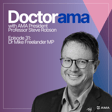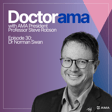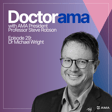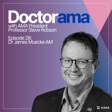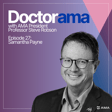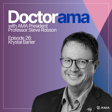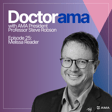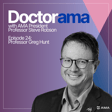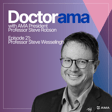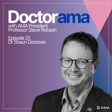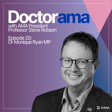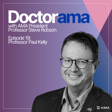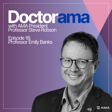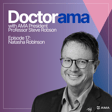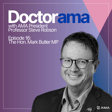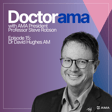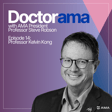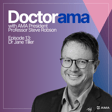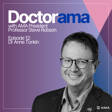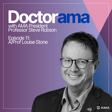Become a Creator today!Start creating today - Share your story with the world!
Start for free
00:00:00
00:00:01

Episode 23 - Heal Thyself
In episode 23 of Doctorama AMA President Professor Steve Robson shares his story as told to the Weekend Australian.
Photo by Rohan Thomson.
With thanks to Natasha Robinson.
Recommended
Transcript
Introduction and Early Experiences
00:00:00
Speaker
Well, I have a different Dr Rama for you this week. Some of you will be aware that I published an article in the Weekend Australian magazine about my experiences as a junior doctor and some of the implications for doctors today. Well, I'm going to read that to you today so you can hear it in my own voice on Dr Rama.
00:00:23
Speaker
You're listening to Dr Rama with Steve Robson, bringing you the best of health, medicine and people.
00:00:31
Speaker
It was hardly a salubrious setting for what was almost the final day of my life. A sparsely furnished tiny brick box of a flat, oppressively warm even at night, an easy walk from the Rockampton Base Hospital where I worked as a junior doctor. I'd carefully laid out a large sheet of black plastic atop the cheap acrylic carpet, the kind of plastic you'd place at the bottom of a lovingly tended garden bed.
00:00:56
Speaker
In the central Queensland humidity, I didn't want my decomposing body to make a mess. In my mind, with my thoughts scrambled by overwhelming guilt, infected by a pervasive sense of failure that I carried like a toxic secret, I felt I had been burdened enough to others already. A few days earlier, a man had died in my care. A local man, a father and a grandfather, someone loved by his family,
00:01:25
Speaker
My decisions, or lack of them, had led directly to him losing his life. At that time in regional hospitals around the country, interns straight out of medical school, like I was, often worked as the only doctors on duty. A major hospital at night can be a lonely place. Senior clinicians could be consulted and called to come in during emergencies, but interns like me often made life and death decisions in the course of patient care.
00:01:55
Speaker
Terrible mix of my inexperience and fatigue had led directly to my patient's death.
Challenges and Mental Health Crisis
00:02:01
Speaker
The consequences of my actions came as a shattering blow, an arrow through my heart. To this day, medicine is not very good at responding to adverse events. It is difficult to prepare a young doctor on how to cope with a patient's death that, despite whatever system failures might have contributed, they believe ultimately is their fault.
00:02:24
Speaker
It is the risk and reward calculus of medicine. The rewards of a lifetime in medical practice can be extraordinary, but the risk that error or miscalculation can result in harm or death is ever present. When that happens to a young doctor, there can be a sense that the system piles blame on top of you, amplifying the already overwhelming feelings of guilt. For me as a young doctor, it was a burden too great to carry.
00:02:52
Speaker
In my recampment apartment as evening fell, I put a cannula in my vein, not an easy undertaking one-handed. I was preparing to feed insulin that I had taken from a hospital supply cupboard through an intravenous drip when there was an insistent wrapping at my apartment door.
00:03:10
Speaker
The visit was from a fellow junior doctor, which for 30 years I believed was a matter of chance, was in fact a matter of instinct.
Systemic Issues in Healthcare Support
00:03:18
Speaker
Colleagues had seen me take the incident from the cupboard and feared what I planned to do. They had interrupted me with seconds to spare. When I first alluded to the story of my own near suicide in the Medical Journal of Australia six years ago, I urged readers
00:03:34
Speaker
If you feel now the way I did 30 years ago, seek help and support as soon as you can.
00:03:41
Speaker
Today that advice remains just as true, yet I see now with clarity that seeking help is only part of the solution. A recent audit by the medical regulator found that 16 Australian practitioners had placed under investigation took their own lives in a three year period alone. Some of these doctors had self-referred to the regulator, suffering mental distress, and instead of receiving a plan and support to move out of the dark place they found themselves in,
00:04:11
Speaker
they were faced with delay and a dysfunctional system. Seeking help is important, but it is not enough. The system in which we work must take responsibility for the pressures it places on doctors, acknowledge the harms inflicted on many who seek to heal and reform. It alarms me that junior doctors continue to experience poor mental health, unsustainable pressure in their working conditions,
00:04:39
Speaker
bullying and appalling treatment by others working in the system, and kill themselves in numbers that are simply intolerable. After more than two years I'll step down as Federal President of the Australian Medical Association, and it is a lot lost on me that I've taken a journey from feeling that my prospects as a doctor were so poor that death was preferable.
Advocacy for Young Doctors and Hope
00:05:02
Speaker
to standing as one of the most visible doctors in the country. I cannot change the system single-handedly, but as someone who has experienced the most profound feelings of inadequacy at the birth of my career, who faced a night so black it was only the luck of timing that I survived it, and who was ultimately, unfathomably, gifted a professional life marked by wonder and renewal as an obstetrician.
00:05:27
Speaker
I want to issue a plea to young doctors to hang in there, reach out and believe in the future. I also want to issue a plea to the system not to let them down. In the decades since my life almost ended in a stifling, recamped and cinder block flat, I've become immersed in medicine, sometimes almost to the exclusion of everything else. More than once since that night, medicine has extracted a heavy toll. Its demands at times have almost broken me.
00:05:58
Speaker
In the decades after my suicide attempt, I tied myself in knots trying to deal with the experience. Indeed, a GP from whom I sought care told me never to mention what had happened to anyone lest it ruin my career prospects and my reputation. Denial was my stock in trade. Although I thought about it each day, I never told anybody else and believed it was a secret that should never be shared. It became a dark black hole deep within me.
00:06:27
Speaker
drawing in the matter from my world and compressing it until it was gone. I'm now telling my story because the burden of responsibility that so many doctors feel cannot be carried alone. I don't want any other young doctor to feel they need to carry a secret like I did for 30 years. I don't want any young doctor to ever feel as inadequate as I did.
00:06:51
Speaker
And I want a health system which in far too many hospitals is characterized by blame, fear and depression to face up to its too often toxic culture. The ramifications for staff wealth are obvious, but it's also a matter of patient safety. It's a tragedy to me that some junior doctors abandoned the system, burned out and dispirited or worse, and will never know the joys that may lie ahead.
00:07:21
Speaker
I had the privilege literally of holding many lives in my hands, often of newborn babies and sometimes of their mothers. I've spent decades helping people dealing with every experience from the deepest grief to the highest exhilaration. I've learned about fear, about love, about when to ask for help, about caring and about the power of hope. I want every
Personal Journey and Overcoming Challenges
00:07:48
Speaker
young doctor to hold onto hope.
00:07:53
Speaker
When I was growing up in a small town in 1960s Queensland, no one in my family had ever been to university. My father trained as a carpenter and my mother was a ballerina. They ran a motel in citrus country in rural Queensland before we moved to Toowoomba, where my father began a wholesale fruit and vegetable transport business. One of the people we delivered to was a medical specialist we called Doc Stringer, whose home seemed to be a place of perpetual chaos and fun.
00:08:22
Speaker
He was a wonderful conversationalist, the owner of a fleet of old Mercedes, a fascinating and gregarious character. He encouraged me to be a doctor. My school careers counselor, Mr. Bradley was skeptical that I could get the marks necessary for acceptance to Queensland's medical school. I was determined though, and to the amazement of everyone, I managed to reach the standards. I wish I could tell a story of breezy inevitability, but that was not the case for me.
00:08:52
Speaker
I had to give up almost everything except study and still just scraped enough marks. The experience of moving to Brisbane and the adjustment to university was overwhelming. I failed key subjects and had the humiliation of sitting supplementary examinations. Most of my fellow medical students seemed to take study in their stride, but I felt like I was standing before a sheer cliff. Over my career, I've learned that fear does not have to be the enemy though.
00:09:21
Speaker
Fear affects how we act, and recognizing this can help us care better for people in our lives. Fear was something I learned a lot about soon after I left Rockhampton. To pay my way through the last years of medical school, I'd taken a scholarship with the Royal Australian Navy and become a medical officer. I'd eventually go to the Gulf War as a doctor. During this time, I completed the Army's parachuting course, despite having an acute fear of heights.
00:09:49
Speaker
During the course, a large part of which involved jumping out at the back of a C-130 Hercules transport plane at 1000 feet, I spent several weeks in a state of fearful panic. Prolonged fear has profound effects on one's physiology, and I could barely sleep or eat. But despite my paralyzing fear, I did manage to complete the course and earn my parachute wings, much to my own amazement.
00:10:16
Speaker
It was the most physically and mentally challenging training I had ever undertaken. The experience gave me a deep and enduring respect for fear.
Impact of Fear in Medicine
00:10:28
Speaker
Ultimately, I devoted my professional career to pregnancy and birth.
00:10:32
Speaker
I often cared for people who were fearful. If a birth is complicated, an urgent action is required to say baby or mother, fear is often in the air. Fear is contagious. It can spread not only from mother to staff, but also in the other direction. The appearance of panicking staff can turn a dangerous situation into a completely out of control one. That is when bad things happen and scar those involved with a patient or carer for life.
00:11:03
Speaker
I found that I had a sixth sense about fear and could pick it up in people, even if they were doing the best to hide it. This allowed me to articulate fear and raise it first. Sometimes it would be like our shared secret. Many times I would explain that I too had experienced it. I could understand how fear changes people and distorts their decision making. Many doctors, especially those completing their specialist training, confront fear in themselves too.
00:11:32
Speaker
Something I've learned on my long journey through medicine is that love can overcome fear, yet rarely do we talk about this. Just as I've learned about the effects of fear, I never underestimate the power of love. In the same way that fear affects our perceptions and our decision-making, so too does love. I want junior doctors who are navigating the health system to understand just what love can do.
Love, Loss, and Ethical Decisions
00:11:58
Speaker
Almost a decade ago, I received a call about a situation that would, over time, utterly transform my understanding of the effects of love. That call was from a colleague who worked interstate. He told me the story of a man who'd been killed in a motorcycle accident several years before.
00:12:16
Speaker
Reproductive tissue containing sperm was taken from his cold body 48 hours after his death, but his partner had struggled to obtain a court order on a weekend, allowing the sperm to be retrieved. It had remained frozen ever since. Overwhelmed with grief, as all of us would be if the love of our life was taken from us, she had worked through the courts to demonstrate that, had her partner survived the accident, their intention was to have a child together.
00:12:46
Speaker
It has been an incredible emotional and financial challenge. My colleague was calling to ask if I'd be prepared to perform IVF treatment with the long frozen sperm with a view to the man's widow having a child. I was extremely dubious. Taking sperm 48 hours after death had never been done and nobody knew what the outcome would be. Yet I was intrigued. So I flew interstate to meet and speak with the woman seeking treatment.
00:13:19
Speaker
She and I spent a morning talking over coffee near a suburban park. She told a story of love that was irresistible to me, of plans for a life together, of their commitment to each other, of their wish for a family. By lunchtime, I'd been won over and wanted to help, to take the journey with her. This was a love story for the ages. Incredibly, her eggs were fertilized and we were able to achieve a healthy pregnancy using the long frozen sperm.
00:13:50
Speaker
Over the course of the pregnancy, I kept in close contact both with her and her interstate obstetrician. A healthy child was born and I was so overwhelmed by the outcome that I flew over to see the new mother and baby. To this day and under close surveillance, her child appears to be healthy and normal in every way. Love is perhaps the most powerful force in decision making.
00:14:15
Speaker
We've all done crazy things for love and I've had the privilege to play a very small part in a love story for the ages. When young doctors feel overwhelmed or struggle with dark thoughts, I want them to look towards love and its power to heal. At the time I tried to fill my body with insulin and end my life, I saw no hope.
Alarming Statistics and Need for Change
00:14:36
Speaker
I know that many other people have reached this point. I now never underestimate the power of hope.
00:14:43
Speaker
Being given hope can reshape the experience of illness or injury for patients and everyone around them. It was something I'd lost as a new doctor and something that took a long time to regain after my suicide attempt. I am not the only doctor who has attempted suicide. I have close friends who have taken their own lives and the data tell us that the suicide rate among doctors is 34% higher than the community more broadly.
00:15:12
Speaker
For female doctors, the suicide rate increased almost fivefold between 2006 and 2017, according to a study published last year. Surveys of young Australian doctors report that half of them have high levels of emotional distress.
00:15:30
Speaker
Understanding this and offering hope and support, particularly to young doctors, should be a priority not only for my profession, but for those who control and regulate medical practice. The feeling of being overwhelmed, particularly when things go wrong for our patients, can be terrible. As I become older, the temptation to sidestep difficult problems when the going gets tough has not gone away. As a doctor, though, things are not so easy.
00:15:58
Speaker
A recent case demonstrated powerfully that patients depend on you, absolutely not to take away hope. I saw a patient who was pregnant for the second time. Her first baby had been born by a caesarean section and all had gone well. In this pregnancy, however, there was a major problem. It was the pregnancy complication obstetricians fear the most.
00:16:23
Speaker
The baby's placenta had implanted low and was growing through the scar of the previous cesarean and into my patient's bladder. This complication, given the horrifying name morbidly adherent placenta, is dangerous to mother and baby. I had a series of frightening discussions with the patient and her husband as their toddler played in the room. Just how serious is the situation?
The Role of Hope in Medicine
00:16:48
Speaker
they asked. About as serious as it gets.
00:16:53
Speaker
Could I die? She asked. Yes. The patient and her husband shared anxious looks, but she told me, well, we trust you and are glad to be in your hands. I've been a surgeon for over 30 years and spend a lot of time performing difficult surgery for conditions such as endometriosis and large tumors.
00:17:15
Speaker
I knew that the surgery required to safely deliver this baby and to prevent the woman bleeding to death would be difficult and complex. As the baby's birthday approached, I felt more and more anxious. I would lie in bed at night, unable to sleep, playing out the birth in my head and fretting about leaving the baby motherless and the father a widower.
00:17:38
Speaker
I had assembled a very experienced team to help me. Vascular and urological surgeons, a top flight anesthetist, and intensive care team. The baby was delivered early in the morning, healthy and well, and we set about dealing with removing the placental tissue that had invaded widely in the mother's pelvis.
00:17:58
Speaker
The bleeding was extraordinary, overwhelming for us. We worked at the peak of our skills for hours. By late morning I had a very grim feeling and we had no hope. The blood vessels were so large, so widespread, that controlling things would not be possible. It was a horrifying feeling. But we packed our abdomen with sponges and caught our breath. And as overwhelming as the situation felt, we were not going to give up.
00:18:28
Speaker
Gradually, we began to gain control. By the time she was wheeled to the waiting ICU bed, we estimated her blood loss at 12 litres. Yet she recovered quickly without complication and went home with a baby. Rarely have I been so gratified by a result. The family, mum, dad and two children moved interstate soon afterwards. I received a message on the child's first birthday.
00:18:57
Speaker
photo of the whole family, smiling and happy in the new home. It was awe-inspiring. Never give up hope. The pandemic wreaked havoc with our health system and a pervasive sense has taken hold that hospital administrators don't care about their workforce.
00:19:16
Speaker
Wage theft class actions reveal that hundreds of millions of dollars in fairly earned wages were never paid to junior doctors who have been expected to work excessive over time under great pressure for free. This has compounded a burden that so many already shoulder. Bullying and harassment is commonplace. There is a crippling sense that nobody cares for the carers in an era when many are at their most vulnerable.
00:19:45
Speaker
Yet shouldn't the patients who seek care in our health system receive medical care from doctors who are at their peak? Fewer mistakes will be made, problems will be solved more efficiently, and the care will be better. In the years after I tried to take my own life, I struggled with my emotions and my shame.
Mental Health Stigma and Recovery
00:20:04
Speaker
So many people across Australian society, from every profession and vocation, have told me that they have experienced the same things.
00:20:13
Speaker
Doctors are famously secretive with their own health conditions, and for many years I was no different. I worried that referrals to my practice would dry up if words spread among colleagues that I was impaired by mental health conditions, or that I might try to kill myself again. Help was available. Indeed, as a physician, I was literally surrounded by people who could help, but I decided it was better to bottle up these problems, to hide them, and try to deal with them myself, rather than admit I was suffering.
00:20:42
Speaker
Recovery from the mental health problems of my early career was an arduous, draining and isolating process. If there is a single message that I want to pass on to anyone in such a dark place, it is that help is available. I had the incredible luck to have a second chance, to have colleagues intervene just at the critical moment. It has been possible for me to build a career based around caring, to deal with fear and embrace love, to give hope to others,
00:21:12
Speaker
It was a difficult and steep path and I don't want to suggest even for a second that climbing from the depths has been easy or that I'm unscared.
Critique of Healthcare Support Systems
00:21:21
Speaker
It is possible though. For doctors who have spent years trying to master their craft and so many hours memorizing the body of knowledge that underpins everything they do, the burden of responsibility can be overwhelming.
00:21:36
Speaker
Working in a system that is overstretched and places so many demands on individuals and yet is so unforgiving can be a devastating experience. Ultimately, the system that provides our healthcare must value those who work in it. It is not enough to leave young doctors unsupported and adrift in a system that is so important to so many people.
00:22:00
Speaker
Patients have a right to expect that they're treated by people who are functioning at the highest level, not crushed by demands of the system. Yet over the years since I first wrote of my experience and made my plea that other doctors do not suffer like I did, nothing of substance has happened. Hospitals and health systems seem to care less and regulatory systems place burdens that are ever more stressful. Nobody takes responsibility.
00:22:28
Speaker
I was more lucky than I could ever have imagined. I was saved by caring colleagues at the last moment. But it should not fool the colleagues to save their own. That is the responsibility of the systems that run our hospitals and medical training institutions. Unfortunately, this message has not gotten through yet, despite the evidence of harms the system inflicts. Each life lost is a tragedy that further diminishes our system. I should know.
